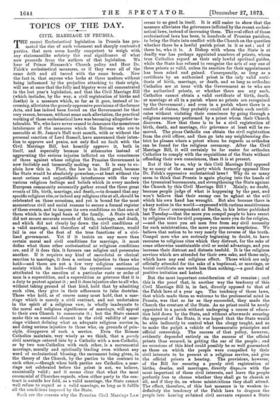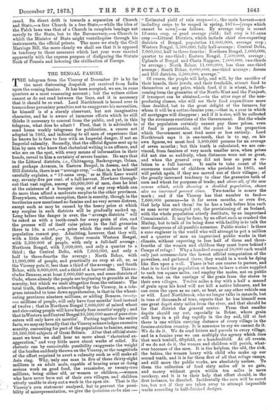TOPICS OF THE DAY.
CIVIL MARRIAGE IN PRUSSIA.
THE recent Ecclesiastical legislation in Prussia has pro- moted the rise of such vehement and sharply contrasted parties, that men seem hardly competent to weigh with any statesmanlike sobriety the real significance of what now proceeds from the authors of that legislation. We hear of Prince Bismarck's Church policy and Herr Dr. Falck's ecclesiastical measures, as if they were all of the same drift and all tarred with the same brash. Now the fact is, that anyone who looks at these matters without being influenced by the prejudice attaching to their origin, will see at once that the folly and bigotry were all concentrated in the last year's legislation, and that the Civil Marriage Bill (which includes, by the way, a civil registration of births and deaths) is a measure which, so far as it goes, instead of in- creasing, alleviates the grossly oppressive provisions of the former Acts, and has indeed been forced on the Government for that very reason, because, without some such alleviation, the practical working of those ecclesiastical laws was becoming altogether in- tolerable. We, who have never ceased to denounce the-monstrous intolerance of the measures which the Britons who are to assemble at St. James's Hall next month, with or without the personal sanction of Lord Russell, have announced their inten- tion to approve and praise, not only find no fault with the Civil Marriage Bill, but heartily approve it, both in itself, and especially because it attenuates instead of aggravating the serious injuries inflicted on the consciences of those against whose religion the Prussian Government is now foolishly and immorally making war. It is easy to ex- plain how this is. First, the law is in itself good, because the State would be absolutely powerless,—at least without the most serious and unjustifiable interference with the very various religious feelings and beliefs which in every modern European community necessarily gather round the three great events of life, birth, marriage, and death,—to demand that any specific religions rite, or indeed any religious rite at all, should be celebrated on those occasions, and yet is bound for the most momentous civil and social reasons to secure a formal register of these events, and to impose its own conditions on that one of them which is the legal basis of the family. A State which did not secure accurate records of birth, marriage, and death, and which did not clearly lay down the civil conditions of a valid marriage, and therefore of valid inheritance, would fail in one of the first of the true functions of a civi- lised government. Yet if it insists on any more than certain moral and civil conditions for marriage, it must define what those other ecclesiastical or religious conditions are, and if it does this, it favours one religion and persecutes another. If it requires any kind of sacerdotal or clerical sanction to marriage, it does a serious injustice to those who hold—and there are not a few very religious sections of society which do hold—that the mysterious consecration attributed to the sanction of a particular easte or order of men is a superstition, and a superstition so grievous that it is a duty to protest against it ; and it does injustice also to all who, without taking ground of that kind, hold that by admitting such rites, they give in their adherence to false doctrine. Those who hold, as of course many must hold, that a mar- riage which is merely a civil contract, and not undertaken in the spirit of a religious vow, is wholly inadequate to the moral and religious significance of marriage, will appeal to their own Church to consecrate it ; but the State cannot make this an essential element in the civil validity of mar- riage without defining what an adequate religious service is, and doing serious injustice to those who, on grounds of prin- ciple, disapprove of such a service. Even the Roman Catholics maintain, very wisely as we think, that a purely civil marriage entered into by a Catholic with a non-Catholic, or by two non-Catholics with each other, is a sacramental marriage, morally and spiritually binding even without any word of ecclesiastical blessing, the sacrament being given, in the theory of the Church, by the parties to the contract to each other,—though when both parties are Catholics, a mar- riage not celebrated before the priest is not, we believe, canonically valid ; and it seems clear that what the most
ceremonial of Churches regards, when either party to the con- tract is outside her fold, as a valid marriage, the State cannot well refuse to regard as a valid marriage, so long as it fulfils all the conditions imposed by the State.
Such are the reasons why the Prussian Civil Marriage Law seems to us good in itself. It is dill easier to show that the measure alleviates the grievances inflicted by the recent ecclesi- astical laws, instead of increasing them. The real effect of those ecclesiastical laws has been, in hundreds of Prussian parishes, to bring the State into conflict with the Church on the question whether there be a lawful parish priest in it or not ; and if there be, who it is. A Bishop with whom the State is at deadly war has perhaps appointed numbers of priests, whoma true Catholics regard as their only lawful spiritual guides, while the State has refused to recognise the acts of any one of these priests as valid, unless its sanction for their appointment has been asked and gained. Consequently, so long as a certificate by an authorised priest is the only valid certi- ficate of birth, marriage, or death, and so long as orthodox Catholics are at issue with the Government as to who are the authorised priests, or whether there are any such, Catholics cannot obtain a valid certificate of birth, death, or marriage at all in a parish where no priests are recognised by the Government ; and even in a parish where there is a conflict of claims, they probably could not obtain such certifi-- cates without violating their conscience by going through a religious ceremony performed by a priest whom their Church disavows. Now that there is to be a civil registration of birth, death, and marriage, this grievance at least will be re- moved. The pious Catholic can obtain the civil registration from the civil officer, and then go into any neighbouring dis- trict he pleases where a priest whom he regards as orthodox can be found for the religious ceremony. After the Civil Marriage Bill, it will certainly be far easier for orthodox Catholics to comply with the requisitions of the State without offending their own consciences, than it is at present.
But if this be so, why is this Civil Marriage Bill opposed by so many of the same party which formerly opposed Herr Dr. Falck's oppressive ecclesiastical laws ? Why do so many seem to think that Prussia is again playing into the hands of the tyrannical bureaucrats, and strengthening the State against the Church by this Civil Marriage Bill ? Mainly, no doubt, because people judge of what is happening by the past, and won't believe that their enemy can be aghast at the evil which his own hand has wrought. But also because there ia ahazy notion in the world—expressed with curious sensitiveness by the Times' correspondent at Berlin, in his letter published last Tuesday—that the more you compel people to have resort to religions rites for civil purposes, the more you do for religion, —and the more you set men free from any civil necessity for such ministrations, the more you promote scepticism. We believe that notion to be very nearly the reverse of the truth. Compel men who are seriously beginning to doubt, to have recourse to religious rites which they distrust, for the sake of some otherwise unattainable civil or social advantage, and you increase their distrust and distaste tenfold. It is the religious services which are attended for their own sake, and those only, which have any real religious effect. Those which are only officially attended for the sake of a baptismal, or marriage, or burial certificate are worth less than nothing,—a good deal of positive irritation and hatred.
But the most important consideration of all remains ; and this is the proof that, in another way the tendency of this Civil Marriage Bill is, in fact, directly opposed to that of the Feick laws of a year ago. The tendency of those laws, that which made them so welcome to the professorial mind in Prussia, was that so far as they succeeded, they made the Church the creature of the State. As no priest could be newly appointed to a parish without undergoing a course of educa- tion laid down by the State, and without afterwards securing the approval of the State, it was hoped that the State would be able indirectly to control what the clergy taught, and so to make the pulpit a vehicle of bureaucratic principles and official censorship. The success of that policy, however, evidently depended entirely on the success of the official priests thus secured, in getting the ear of the people ; and no occasions of this kind could possibly be so well guaranteed as those on which the people were compelled by their civil interests to be present at a religious service, and give the official priests a hearing. The provisions, however, of the Bill for securing a purely civil registration of births, deaths, aid marriages, directly dispease with the most important of these civil interests, and leave the people perfectly free to choose whether they shall go to church at all, and if they do, on whose ministeations they shall attend. The effect, therefore, of this last measure is to weaken in- definitely the tendency of the Feick laws to dragoon the people into hearing ordained civil servants expound a State creed. Its direct drift is towards a separation of Church and State,—a free Church in a free State,—while the idea of the Feick laws was that of a Church in complete bondage not merely to the State, but to the Bureaucracy,—a Church in which the Minister of State might ventriloquise through his instruments, the official priests. The more we study the Civil Marriage Bill, the more clearly we shall see that it is opposed in tendency to those measures which last year were enacted apparently with the express purpose of disfiguring the Statute Book of Prussia and lowering the civilisation of Europe.



































 Previous page
Previous page